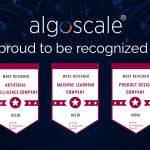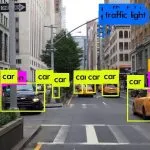The pharmaceutical research landscape stands on the cusp of a remarkable transformation, propelled by the unstoppable march of artificial intelligence and machine learning (AI/ML). With the potential to slash drug development costs by up to 40% and fast-track time to market by an astonishing 50%, AI’s impact is undeniable. In this blog, we’ll delve into the AI-driven revolution sweeping through the pharmaceutical industry, illuminating how ‘AI in drug development’ not only reshapes the process but also opens new doors beyond conventional animal testing in clinical trials.
AI in Drug Discovery
The journey begins with drug discovery, where AI in pharma rapidly expands the boundaries of what is possible. AI’s ability to process and analyze vast datasets dwarfs traditional systems, making it a powerful tool for handling the explosion of medical knowledge and clinical trial data. Medical knowledge, which used to double every 50 years in the 1950s, now doubles approximately every 70 days.
This data surge is further fueled by increased protocol complexity, the focus on rare diseases, and the growing use of biomarkers and patient stratification. For example, a single Phase 3 trial generates an average of 3.6 million data points, three times more than a decade ago. The average number of investigative sites conducting phase 2 and 3 protocols has also increased by 33% since 2009.
This complexity contributes to high failure rates in drug development. The likelihood of a new drug advancing to the next stage or receiving regulatory approval is dismally low, hovering around 14% for all therapeutic areas. Phase III trials, critical for establishing efficacy and safety, range from just under 36% for oncology to over 85% for vaccines.
Global Connection
The pharmaceutical industry has embraced AI to keep pace with this data deluge. AI encompasses a range of advanced software tools and networks capable of mimicking human functions. Machine learning, a subset of AI, employs algorithms to recognize patterns in classified data. Deep learning, a subfield of machine learning, uses artificial neural networks (ANNs). This landscape has given rise to generative AI applications, such as ChatGPT, that can create content across various formats.
AI in the Lab
AI/ML is poised to revolutionize drug discovery by making it more cost-effective and faster while enhancing the likelihood of approval. It plays a pivotal role in various stages of drug discovery, including:
- Drug Design: AI/ML aids in rational drug design by predicting molecular properties, solubility, bioavailability, and toxicity. It optimizes the drug discovery process.
- Polypharmacology and Repurposing: AI/ML identifies opportunities for drug repurposing, potentially reducing time and costs. It can uncover new uses for existing drugs.
- Preclinical Development: AI can test potential drug targets on animal models, predict drug interactions, and analyze molecular structures to anticipate properties like solubility and toxicity.
- Drug Target Identification: By analyzing large datasets, AI can identify novel drug targets, aiding in developing drugs for previously unaddressed diseases.
AI in Biomarkers
AI is also gaining prominence in developing digital biomarkers, which provide valuable insights into patients’ health. These digital biomarkers leverage AI/ML to analyze sensor-derived data and can be used to accelerate clinical trials. Companies like Janssen, Roche, and Regeneron have already incorporated AI-powered digital biomarkers in Phase 1 through 4 clinical trials. These artificial intelligence solutions enable faster tests, reduced sample sizes, and more efficient data collection.
AI in Clinical Trials

Clinical trials are the crucible in which new drugs are tested and refined. AI promises to enhance clinical trials in several ways:
- Automation: AI can automate various tasks, reducing human involvement in creating analytics and documenting large volumes of trial data.
- Protocol Design: AI-driven study design optimizes trial parameters, from endpoints to sample sizes, reducing amendments and enhancing efficiency.
- Patient Screening: AI algorithms identify suitable trial participants based on their medical characteristics, potentially expanding the pool of eligible participants.
- Real-Time Monitoring: Continuous monitoring of patients using AI ensures safety and enables timely intervention if issues arise.
- Adherence and Retention: AI tools like smartphone alerts and chatbots improve patient adherence and retention.
- Documentation and Dosing: AI automation accelerates the summarization and analysis of large volumes of information required for regulatory submissions. AI models predict drug pharmacokinetics, helping optimize dosing regimens.
- Data Management: AI automates data cleaning and curation, enhancing data quality for regulatory purposes.
- Digital Twins: AI-driven digital twins create in-silico duplicates of patients, aiding in understanding treatment effects and enabling more informative clinical trials.
Regulatory AI Leadership: Going Beyond Animal Testing
The FDA has recognized the transformative potential of AI in drug development and has released a discussion paper outlining its vision for AI/ML in the industry. This paper covers AI applications in target identification, compound screening, clinical research, post-market safety surveillance, and pharmaceutical manufacturing. It highlights AI’s role in analyzing real-world data (RWD) and data from digital health technologies (DHTs) to inform drug development.
The FDA is increasingly emphasizing the utilization of Artificial Intelligence (AI) and computational models in drug development and therapeutics. These technologies offer a cost-effective approach to drug development, notably through Computer-aided Drug Design (CADD). CADD encompasses modern techniques like computational chemistry, molecular modeling, molecular design, and rational drug design. AI has enhanced this computational approach by leveraging extensive data from computational models. It utilizes the LLM algorithm to predict drug interactions with target proteins, ultimately reducing the need for animal testing.
Clinical Research Change Long Overdue- Real-World Impact
Traditional drug development is costly and time-consuming. For instance, the COVID-19 vaccine developed by Moderna, which leveraged AI drug development, was brought to market in record time. However, longer timelines remain a significant challenge, with average drug development taking 10 to 12 years.
A company, Quris AI, is pioneering a novel approach to drug testing. By using AI to create miniature human organs and testing thousands of drugs on these “Patients-on-a-Chip,” they can predict drug safety and effectiveness with unprecedented accuracy. This technology can potentially replace or drastically reduce animal testing, making drug development safer and more ethical.
Similarly, BenevolentAI employs AI to discover new drug targets and expedite drug development, with promising candidates currently in the clinical pipeline. Another company, Alphabet’s subsidiary, Verily, leverages AI to optimize clinical trial design, management, and outcomes. Their work on predicting regulatory approval likelihood adds a data-driven dimension to decision-making.
Multiple companies are utilizing AI and its allies to drive change in drug discovery, trial, and formation.
Closing Thoughts
In conclusion, AI’s impact on drug development is nothing short of revolutionary. From drug discovery and clinical trials to regulatory approval, AI offers unprecedented opportunities to accelerate the development of new drugs and therapies. As AI continues to evolve, we can expect more precise and personalized treatments that benefit patients and revolutionize the pharmaceutical industry as we know it.
Algoscale, with its expertise in AI and data analytics, is equipped to offer tailored consulting services to guide clients in implementing AI-driven drug development solutions and healthcare IT solutions. Additionally, we can provide ongoing support and customization to optimize AI models for specific pharmaceutical research needs. We have a strong portfolio of working with Healthcare and Pharmaceutical companies, which renders us unprecedented expertise in handling similar projects. Connect with us to learn how we can collaborate.












